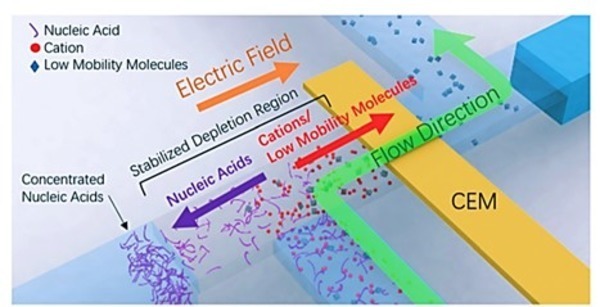Microfluidic Device for Improved Nucleic Acid Isolation
Tech ID: 20-006
Inventor: Hsueh-Chia Chang, Satyajyoti Senapati, Chenguang Zhang, Gongchen Sun
Date Added: September 30, 2020
Overview
A new device is proposed that will improve sensitivity of nucleic acid diagnostic tests.
Technology Summary

PCR-based screening tests, including ones for COVID-19, must isolate the pathogen RNA and DNA from reaction inhibitors in the sample. The yield of this pretreatment step determines the sensitivity or false-negative rates of the test. Therefore it is imperative that the nucleic acid isolation process is efficient and reliable. Yet current commercial nucleic acid isolation processes based on solid or liquid extraction are tedious and inefficient. They are chiefly responsible for the high false-negative rates of the current PCR-based tests. The low sensitivity of the current tests prevents important extension to applications with low viral or bacteria loads, such as pooled screening and food-borne pathogens.
Researchers at the University of Notre Dame have developed a microfluidic approach to improve the nucleic acid isolation process. After inserting the sample into the inlet, the electric field drives nucleic acids down one channel and all other contaminants down a different channel. The isolated nucleic acids are then simply extracted from the outlet in one single step.
Market Advantages
This approach increases yield 4X compared to the leading commercial kit, increases purity, decreases contamination, increases user-friendliness, eliminates multiple-step operation and thus increases the sensitivity of the downstream diagnostic tests to enable many new applications.
Applications
- Total Addressable Market: $2.14B/yr
- Diseases Diagnostics
- Academic/Laboratory Research
Technology Readiness Level
TRL 4 – Lab Validation
Intellectual Property Status
Patent Pending
Publications
A Bifurcated Continuous Field-Flow Fractionation (BCFFF) Chip for High-Yield and High-Throughput Nucleic Acid Extraction and Purification
DOI: 10.1039/c9lc00818g
Contact
Richard Cox
rcox4@nd.edu
574.631.5158